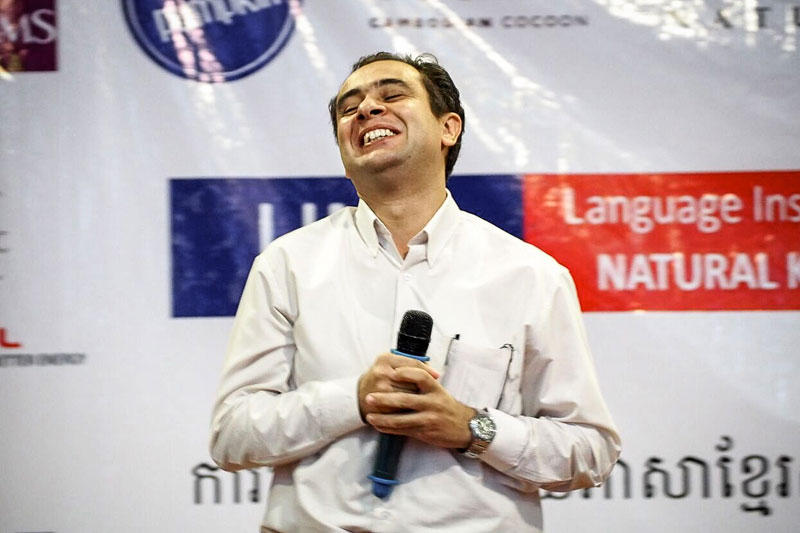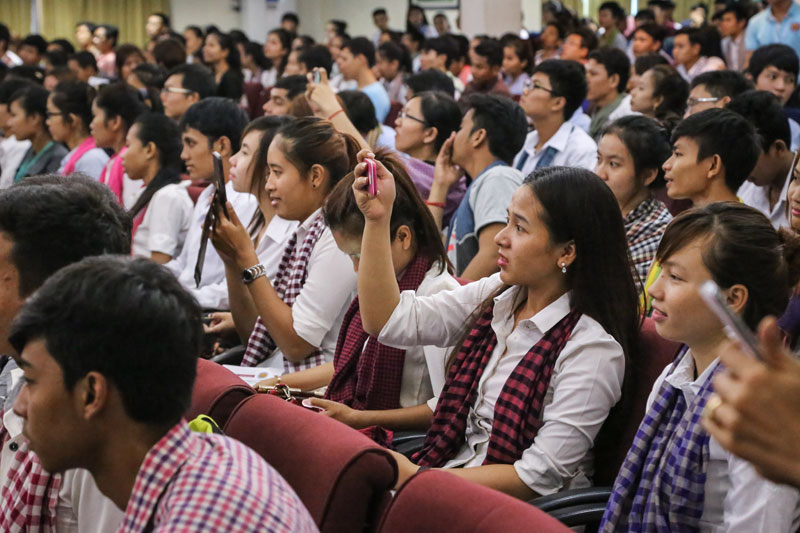Hundreds of students and curious members of the public packed into a lecture hall at Phnom Penh’s Pannasastra University last weekend for what was billed as Cambodia’s first-ever Khmer fluency competition for foreigners.
Putting their skills to the test in front of the home crowd were 22 brave expatriates, a relatively even split of men and women of diverse ages and nationalities—with Japan, France, Belgium, Australia, Italy, the U.K., the U.S. and both South and North Korea represented.

The contestants were required to speak for three minutes on why foreigners should learn Khmer today, then expound on a favorite Khmer expression and reflect on a significant memory from their time in the country. Judging them was a panel including Education Minister Hang Chuon Naron and Culture Minister Phoeurng Sackona.
The foreigners brought a broad range of abilities, with some riffing in fluent Khmer with others struggling to make sense, said Sun Heng, a university student and journalist who helped narrate the event for an expatriate reporter whose utter lack of proficiency in Khmer disqualified him from judging the efforts of more determined foreigners on stage.
“Even the way the foreigners spoke was funny in itself,” he said.
“The Belgian girl who answered ‘Where did you come from?’ with ‘I have been living here for 3 years.’ The Italian girl with the broken leg who joked that her major problem was to cut down on the use of hand motions. Or the North Korean girl, who seemed to prove that the stereotypes we have of North Korea are true, with a stiff posture and formality that was almost militarized,” Mr. Heng reflected.

However, the North Korean’s presentation pleased the judges enough to award Su Rim Ko best speaker in the intermediate level contest.
The rest of the day was swept by the French, with Anne Laure Poree—who has worked with Bunong minority communities in Mondolkiri province—winning the advanced level and Blaise Kilian—advocacy manager at the European Chamber of Commerce—taking top spot in the expert contest.
“His Khmer was perfect, it is hard to tell that he is not Khmer,” Mr. Heng said.
One of the afternoon’s crowd pleasers was Frenchman Gaitan Monzeur, who talked about his favorite Khmer proverb, “thvoeu chrouk kom khlach toek kdao,” which Mr. Heng translated as “don’t be afraid of hot water if you want to cook a pig.” Initially, Mr. Monzeur said his favorite proverb was “tok tok penh bompong,” or “drip by drip, fill the pipe,” a proverb about patience, though his time ran out before he could explain his change in heart.
Another Frenchman, Herve Roqueplan, chanced a risque routine, joking in front of the government ministers and fellow dignitaries about learning Khmer so that he could “go play with the girls.”
“The [comments] kept the crowd laughing,” said Mr. Heng, who noted that although the judges said they would reward personality and delivery, they had gone for proficiency over style in the end.
The organizers of the event were David Jacobs and Sonia Cautain, co-founders of the Language Institute of Natural Khmer (LINK) in Phnom Penh. At LINK, students do not repeat verb conjugations or build up vocabulary through rote learning, but instead learn the “natural” way as a child does—by listening.
Based on a method of learning the Thai language called Automatic Language Growth, which was developed from a theory of natural language acquisition, the method sounds perfect for expatriates who cower from Khmer’s daunting proliferation of vowel and consonant sounds.
But the difficulty of mastering Khmer was evidenced, according to Mr. Heng, by Ms. Cautain, the LINK co-director who took to the stage as Saturday’s second contestant in the intermediate category.
“She talked about her experience with Khmer language as an expat and laughed every now and then at what she was talking about,” he said. “I would have joined in the laughter if I had understood what she was talking about. The crowd laughed, though I think it may have been out of courtesy.”
The highlight of the day for Mr. Heng was the first contestant, Natsuki Takanashi from Japan, who described her experience eating “special” dog meat as part of her presentation.
“The girl’s voice was so soft and her intonation made it almost like a music,” Mr. Heng said. “I’ve never heard Khmer being said this way.”



